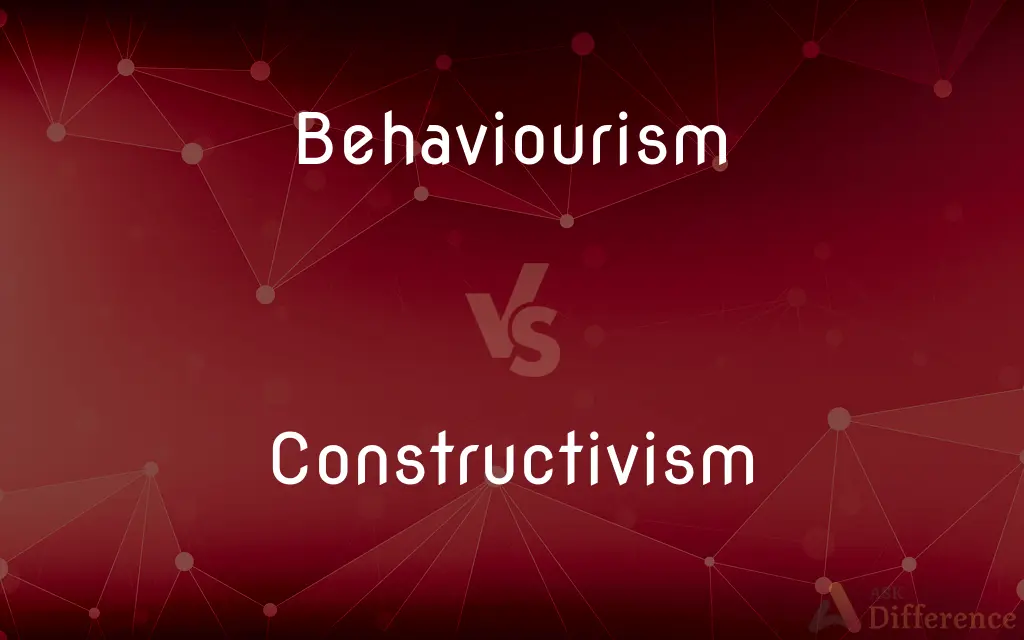Behaviourism vs. Constructivism — What's the Difference?
By Fiza Rafique — Published on October 18, 2023
Behaviourism focuses on observable behaviors and responses to stimuli, while constructivism emphasizes learners constructing knowledge through experiences.

Difference Between Behaviourism and Constructivism
Table of Contents
ADVERTISEMENT
Key Differences
Behaviourism, as a learning theory, stresses the importance of observable behaviors and the responses that result from specific stimuli. It tends to view learning as a passive process where the environment shapes behavior. On the other hand, constructivism posits that learners actively construct knowledge by integrating new information with their existing understanding.
In behaviourism, the educator often plays a central role, directing learning and providing positive or negative reinforcements. In contrast, with constructivism, the educator's role is more of a guide, facilitating learners as they explore, ask questions, and construct knowledge.
While behaviourism often employs methods like repetition and reinforcement to achieve desired behaviors, constructivism leans on real-world problem-solving, inquiry, and discovery.
It's essential to understand that both behaviourism and constructivism offer valuable insights into the learning process, but they focus on different aspects and mechanisms of how individuals learn.
Comparison Chart
Focus
Observable behaviors and responses
Learners constructing knowledge
ADVERTISEMENT
Learning Process
Passive, shaped by environment
Active, integrating new info with existing knowledge
Role of Educator
Director, providing reinforcements
Guide, facilitating exploration and inquiry
Methods
Repetition, reinforcement
Problem-solving, discovery
View on Knowledge
Transmitted and received
Constructed and experienced
Compare with Definitions
Behaviourism
Believes in passive learning.
Behaviourism doesn't prioritize learners' internal processes.
Constructivism
Prior knowledge shapes new understanding.
In constructivism, previous experiences influence new learnings.
Behaviourism
Focuses on external stimuli and responses.
In behaviourism, rewards can shape desired behaviors.
Constructivism
Centers on the learner's perspective.
Constructivism values individual cognitive processes.
Behaviourism
Learning as a result of reinforcements.
Behaviourism uses reinforcements to modify actions.
Constructivism
Learners actively construct knowledge.
Constructivism emphasizes experiential learning.
Behaviourism
A theory emphasizing observable behaviors.
Behaviourism examines how students react to stimuli.
Constructivism
Emphasizes real-world problem-solving.
Constructivism encourages hands-on learning experiences.
Behaviourism
Based on empirical evidence.
Behaviourism studies learning through observable evidence.
Constructivism
Knowledge is constructed, not transmitted.
Constructivism sees learners as creators of their understanding.
Behaviourism
(British spelling) behaviorism
Constructivism
A style or movement in which assorted mechanical objects are combined into abstract mobile structural forms. The movement originated in Russia in the 1920s and has influenced many aspects of modern architecture and design.
Behaviourism
Same as behaviorism.
Constructivism
A view which admits as valid only constructive proofs and entities demonstrable by them, implying that the latter have no independent existence.
Behaviourism
An approach to psychology that emphasizes observable measurable behavior
Constructivism
A movement in modern art originating in Moscow in 1920 and characterized by the use of industrial materials such as glass, sheet metal, and plastic to create nonrepresentational, often geometric objects.
Constructivism
(arts) A Russian movement in modern art characterized by the creation of nonrepresentational geometric objects using industrial materials.
Constructivism
(mathematics) A philosophy that asserts the need to construct a mathematical object to prove it exists.
Constructivism
A psychological epistemology which argues that humans generate knowledge and meaning from their experiences.
Constructivism
An abstractionist artistic movement in Russia after World War I; industrial materials were used to construct nonrepresentational objects
Common Curiosities
Which theory is more learner-centric?
Constructivism is more learner-centric, emphasizing individual knowledge construction.
How do educators' roles differ in behaviourism and constructivism?
In behaviourism, educators direct learning with reinforcements, while in constructivism, they guide and facilitate exploration.
Can these theories coexist in a learning environment?
Yes, many educators blend elements of both, depending on the context and learning objectives.
How does behaviourism handle undesired behaviors?
Behaviourism uses reinforcements, either positive or negative, to shape desired behaviors.
Are all behaviors learned according to behaviourism?
Behaviourism primarily focuses on learned behaviors, especially those shaped by reinforcements.
Can learners have unique learning paths in constructivism?
Yes, constructivism values individualized learning experiences and recognizes varied paths to understanding.
Does constructivism ignore the role of the teacher?
No, in constructivism, teachers play a crucial guiding and facilitating role, aiding learners in their explorations.
How does behaviourism view the learning process?
Behaviourism sees learning as a passive process shaped by the environment and external stimuli.
What's a primary tenet of constructivism?
Constructivism believes learners actively construct knowledge by integrating new and prior information.
In what settings is behaviourism commonly applied?
Behaviourism is often applied in settings requiring behavior modification, like therapy or training.
Which theory might use drills for learning?
Behaviourism might employ drills, repetition, and practice as methods of reinforcing desired behaviors and skills.
How does constructivism view failures in learning?
Constructivism sees failures as opportunities for learners to reassess and reconstruct their understanding.
Which theory is based on empirical evidence?
Behaviourism heavily relies on empirical evidence through observable behaviors and reactions.
How do both theories view knowledge?
Behaviourism sees knowledge as transmitted and received, while constructivism views it as actively constructed.
Which theory relies more on discovery learning?
Constructivism emphasizes discovery learning, where learners explore and find out on their own.
Share Your Discovery

Previous Comparison
Provident Fund vs. Pension Fund
Next Comparison
Fuchsia vs. Hot PinkAuthor Spotlight
Written by
Fiza RafiqueFiza Rafique is a skilled content writer at AskDifference.com, where she meticulously refines and enhances written pieces. Drawing from her vast editorial expertise, Fiza ensures clarity, accuracy, and precision in every article. Passionate about language, she continually seeks to elevate the quality of content for readers worldwide.
















































